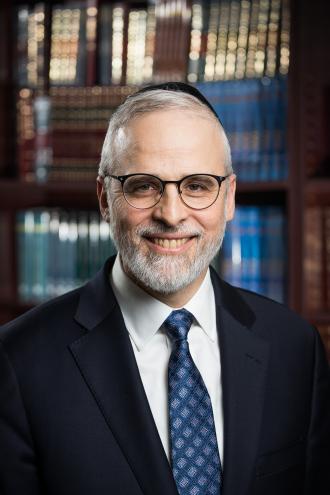Parshas Bahalosecha, Shlach, and Korach represent a dramatic turn in the direction of the history of Klal Yisroel. Up until this point, the life of Klal Yisroel surrounded the Mishkon and hashroas haschechinoh. Their destination of entering and settling Eretz Yisroel is clear and open. But when we reach these parshiyos, things rapidly deteriorate and the march to Eretz Yisroel comes to a grinding halt. Hashem cuts off communication with Moshe Rabbeinu for nearly forty years until parshas Chukas. This historic transition contains many important fundamentals in the understanding of the dynamic relationship Klal Yisroel has with Hashem.
Parshas Shelach is very confounding.
On the surface, Hashem tells Moshe to send spies. But Rashi explains that this was Moshe's choice, and yet in Parshas Devarim we see that the initiative came from the people. So in truth, Neither Hashem nor Moshe were interested in sending spies. But the people wanted it and Moshe asked Hashem what to do. Hashem let Moshe decide if he wanted to comply with the people's wishes or not. Moshe goes ahead with the plan but the posuk says Hashem also blamed Moshe for the failure.
The question is, what exactly was the sin of the spies. It would seem that they only reported what they saw and experienced. Why were they punished so severely?
When you learn the meforshim, the following picture emerges.
Klal Yisroel, at the time of kabbolas HaTorah, were on a very high level of ruchniyus. Chazal tell us they managed to regain the level of Odom Horishon before his sin. They achieved a level of nevuah one notch under Moshe Rabbeinu. Then the chet ho’eigel happened and they lost their level, but nevertheless Klal Yisroel were living on a supernatural level of existence. They had all their needs taken for them miraculously and all they were occupied with was learning and absorbing Torah. They were dealing directly with Hashem with an entirely different hanhogoh than the norm.
But this higher hanhogo comes with expectations and demands. Hashem expects Klal Yisroel to understand and appreciate the level they were brought to, internalize it, and make it a part of them.
Rav Chaim Volozhin in Nefesh Hachaim writes that Hashem reflects our madreigoh and will respond to how we relate to Him. When we don’t live up to Hashem’s expectations it is reflected in the level of closeness Hashem shows to us.
So Klal Yisroel were moving towards Eretz Yisroel with the mishkon and the Schechinoh through a pillar of cloud and a pillar of fire guiding them directly. But then there are two inverted nuns in Parshas Bahalosechoh. Chazal say these letters signal that a new sefer in Chumash has begun. There is a sharp break from what has been before.
It is the story of the mis’onanim. They complain about the mon and they want meat. Klal Yisroel are sending a message to Hashem that we don’t want to live up to the standards that You have put in place for us. We would rather be free from restrictions.
They blamed their discontent on the five foods that the mon couldn’t simulate. These foods weren’t good for them! But they bristled at the limitations.
At this point, a new Sanhedrin was instituted, and two members—Eldad ad Meidad—had a nevuah that Moshe would die and Yehoshuah would lead Klal Yisroel into Eretz Yisroel. Why are all these transitions occurring at this specific point in time?
The Netziv and Meshech Chochmoh explain that although there is always Divine guidance - hashgocho protis - over Klal Yisroel, the level of hashgocho we receive from Hashem is in flux. There is a hanhogo of hester ponim through derech hatevah, and a hanhogo of gilu ponim with open miracles. Rabbeinu Avrohom Ben HoRambam points out that someone today has no right to assume he is on the level where he can insist on relying upon open miracles to have food miraculously materialize on his table with no effort whatsoever. He has no right to assume that Hashem will change nature to sustain him.
But Klal Yisroel in the midbor were raised up to that level. They had to rely on open miracles to survive such inhospitable conditions. And they were expected to maintain that level going into Eretz Yisroel—to continue to live above the natural order. But Klal Yisroel didn’t want to maintain that level. Hashem had to respond.
Moshe Rabbeinu is leading Klal Yisroel on that higher level. That higher hanhogo of open, direct hashgocho protis defined Moshe Rabbeinu’s leadership. If Moshe Rabbeinu is going to lead Klal Yisroel into Eretz Yisroel, it would demand that Klal Yisroel be prepared not to fight conventional wars and not to function like every other nation-- militarily and economically. It would all be above nature. If Klal Yisroel weren’t prepared to do this, Moshe Rabbeinu cannot lead them. They need a new Sanhedrin with Yehoshuah Bin Nun leading them instead.
Hashem tells Klal Yisroel He is leading them on one level, and if they cannot maintain it and choose hefkeirus, the leadership will have to change. The hashgocho will still be there, but not as open and not as intimate.
Some people only can recognize that Hashem runs the world when they see dramatic, global events that show Hashem is clearly behind it. But they don’t see Hashem in the mundane, everyday functioning of the natural world. They prefer to think that they themselves are in charge of the day-to-day running of their personal lives. But the truth is very different. When Hashem transitions into a lower level of hashgocho that is not through miracles, it doesn’t mean that Hashem leaves people on their own. The fact that Klal Yisroel preferred this transition because they anticipated greater freedom and more control over their lives was a terrible mistake. They would never be free of Hashem’s hashgocho even though they would need to work within nature.
The posuk in Tehilim says although we need to have security guards watching and builders doing construction of our homes, we need to be very cognizant that nothing we do has the power to succeed independently of Hashem’s hashgocho. Klal Yisroel failed to integrate this reality and deluded themselves into thinking that if they operated on the level of tevah, they could be independent of Hashem.
Hashem realized that they haven’t learned the lessons He was teaching them for the past two years. The Ramban in Parshas Bo says the point of experiencing open miracles, is to come to the understanding that Hashem controls nature and manipulates nature. It means that nature is never independent of Hashem’s control—even after the miracles are no longer open and manifest. This was the lesson they were supposed to have learned going into Eretz Yisroel. But the cheit hameraglim revealed that they hadn’t learned this lesson. They thought they were on their own in the task of waging war and conquest. They thought that Hashem’s hand would not be effective once the transition to tevah would be made and hester ponim would prevail. They didn’t internalize the lesson that the hashgocho is not limited by tevah, it is only less direct and less manifest.
One of the most difficult things about dealing with illness and taking measures to maintain one’s health is to keep in mind that everything I do is not really having any effect. All the expert diagnoses and powerful medications people receive are just going through the motions. It is a form of hishtadlus to conceal the hashgocho which is working to cure us through natural means. It is a major nisayon for both the doctor and the patient.
One of the most difficult things about being in business is to internalize that all your hustling and long hours at the office trying to close a deal or sign a contract is not what produces a successful endeavor. Hashem is running this world and He determines if our efforts lead to success or not. It doesn’t mean to just sit back and expect the deal to happen on its own. The two work together in an unbelievable way that we don’t always see.
One of the nisyonos of giving tzedoko is the feeling that I earned this money, why should I give it away and get nothing in return? The answer is you had a Partner alongside you in your business and He deserves a percentage of the profits that He arranged for you to receive. If you think you made it yourself, you feel you are giving charity. But if you realize that He is granting you success, then it is tzedoko—it is the right thing to do.
We give hodo’oh in the brochoh of Modim for all the miracles that happened to me today. But I didn’t see any miracles today! I just went through my normal life routine doing what I do and accomplishing what I set out to do.
But that’s wrong. Many miracles happened to you today. The fact that you were functioning and you did all that you did was due to a series of hidden miracles that you weren’t even aware of. You have to know they happen and thank Hashem for them.
This was the failure of the spies. Klal Yisroel told Moshe to send spies. That very request was unnecessary and revealed a lack of bitachon. Even though they knew about the change in hanhogo to one of tevah, and they heard about the nevuoh that Moshe Rabbeinu would die here and not lead them into Eretz Yisroel on that higher level, still, a nevuoh for evil can be changed through tefiloh and zechusim.
When Yehoshuah did eventually lead Klal Yisroel into Eretz Yisroel without Moshe Rabbeinu, they realized their level had sunk even further down and they needed to send spies again. But while Moshe was alive, it wasn’t necessary. On that level of hashgocho protis, the extra hishtadlus was due to a lack of appreciation for the level they were on and the level of bitachon that was demanded of them.
There is hashgocho protis for protection and prosperity, and as the tochocho tells us, there hashgocho protis for destruction and calamity. There is national hashgocho and individual hashgocho - all on a sliding scale according to our level. To react to events in life—success or failure-- as something that just happens, as “keri”—is sinful. Hashem says Klal Yisroel will eventually get to the bottom level of hashgocho where the hester ponim will be so great that you don’t even notice where Hashem can fit into the picture even behind the scenes.
The nisayon of the spies was the challenge to internalize that feeling that even if we are operating within nature, we are still in Hashem’s hands completely. No different than when we were in the midbor. We don’t need to take these extra measures to feel secure that we can conquer Eretz Yisroel, because Hashem promised us we will succeed regardless.
It is always a nisayon to live one’s life according to the required level of bitachon and not feel that he has to cut corners in halacha or middos to get ahead in life. At the end of the day, our success depends on Hashem alone and we are tested to see if we realize that or not.
Whatever happens, we live our lives with miracles every day in all the details of our lives.















